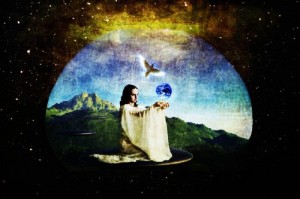The human brain is the only brain on this planet that has the capacity to be consciously aware of the sacred. Not the self-projected sacredness of churches and texts, but something totally beyond thought and knowledge. The fact is, however, humankind is still heading in the opposite direction of wholeness and holiness. As a species we stand in real and present danger of losing our spiritual potential to the self-made forces of darkness, which often act in the name of religion.
 It goes without saying that the sacred cannot be conveyed, because the numinous is utterly beyond word and symbol. Only when the mind and heart are completely quiet and open can it be perceived and felt. That’s why methodless meditation is crucial, because undivided observation quiets the mind and opens the heart to the actuality to which the word ‘sacredness’ refers.
It goes without saying that the sacred cannot be conveyed, because the numinous is utterly beyond word and symbol. Only when the mind and heart are completely quiet and open can it be perceived and felt. That’s why methodless meditation is crucial, because undivided observation quiets the mind and opens the heart to the actuality to which the word ‘sacredness’ refers.
The sacred does not belong to a supernatural realm. It is immanent in the universe, inherent in the energy and structure of everything. At the same time, it originates from beyond the universe, which after all had a birth and will have a death.
I’m neither positing deism nor pantheism. There is no separate God, supposedly seen by the righteous after death. Nor can we be concerned from where the sacred comes. It just is. There is an infinite sacredness beyond thought, and with the complete quiescence of the mind-as-thought, one finds communion with it.
This raises many interesting questions. Contrary to the idea that evolution is aimless and purposeless, there’s a direction beyond the randomness and creative chaos of life. After all, increasing complexity is a direction. Furthermore, on this planet the human brain embodies the intent, intrinsic in evolution, to evolve brains capable of awareness of Mind.
If that’s true, then how do we account for the relentless contradiction that is man, and the evil that man generates, and from which individuals often act?
On one hand, the evolution of ‘higher thought’ is a necessary precondition for sufficient mental/emotional capacity to consciously perceive the sacred. On the other hand, the activity of thought is the greatest impediment to directly perceiving the sacred!
Clearly, symbolic thought is a necessary step for life to become aware of itself, and potentially, the immanent sacredness in the universe. But without deep insight into the nature of thought, as a mechanism based on conscious separation, inevitably ‘higher thought’ generates a growing alienation from nature and God, as well as fragmenting the earth and humankind to the breaking point as humans now are. That’s why there’s an absolute requirement of genuine self-knowing, initiating the movement of negation.
in the universe. But without deep insight into the nature of thought, as a mechanism based on conscious separation, inevitably ‘higher thought’ generates a growing alienation from nature and God, as well as fragmenting the earth and humankind to the breaking point as humans now are. That’s why there’s an absolute requirement of genuine self-knowing, initiating the movement of negation.
Three boys, jammed together on a small rubber raft, come floating down the creek. They’re all Mexican, and as they pass, one says, with a thick Spanish accent, “five more coming.”
Sure enough, a procession of inner tubes, air mattresses, and bodies, totaling some 10 boys (all but one Hispanic), floats downstream. The last two boys have no flotation gear, and are just letting the current carry them. Farcically, their rubber sandals precede them in the water, with the last boy yelling to the second-to-last to catch his footgear.
Meditation deepens effortlessly and timelessly, and after nearly an hour, a palpable feeling of the sacred comes over one. Intense questions and insights into the human mind arise, flow together, and attain a new level of understanding in the meditative state. Then they too dissolve in the emptiness of being. Without a trace of fear one becomes aware of the omni-present actuality of death, and with it, strangely, love.
 Just then two woodland hawks suddenly and loudly make their presence known, calling to each other from high above on both sides of the creek. One of the Cooper’s hawks lands directly overhead. They screech louder than I’ve ever heard them before.
Just then two woodland hawks suddenly and loudly make their presence known, calling to each other from high above on both sides of the creek. One of the Cooper’s hawks lands directly overhead. They screech louder than I’ve ever heard them before.
Their calls, piercing to one’s very core, go on for some minutes, marking the end of the sitting. The appearance of the hawks feels significant somehow, but I don’t know why. In retrospect I see that it was not a confirmation, but a warning of darkness, which attacks insight, even as the person through whom darkness flows deludes himself that he speaks the truth.
The question arises: Is life itself sacred, or is the sacred awakened in the mind and heart of the self-knowing human being who has initiated the movement of negation?
It’s often said that ‘life is cheap,’ and certainly humans treat it that way, as the carnage of war, needless starvation, and the slaughter of animals attest. All of which have been supported, indeed underpinned by organized religions, especially Catholicism and Christianity. Even so, in its extravagance and extinctions, life is prolific, not cheap.
Isn’t that a contradiction — the inexhaustibility of life and the rareness of the sacred? Life, while a precious gift, is probably fairly common in the universe, whereas the sacred, though always present, can only be awakened in the silent mind of sentient beings.
Martin LeFevre

